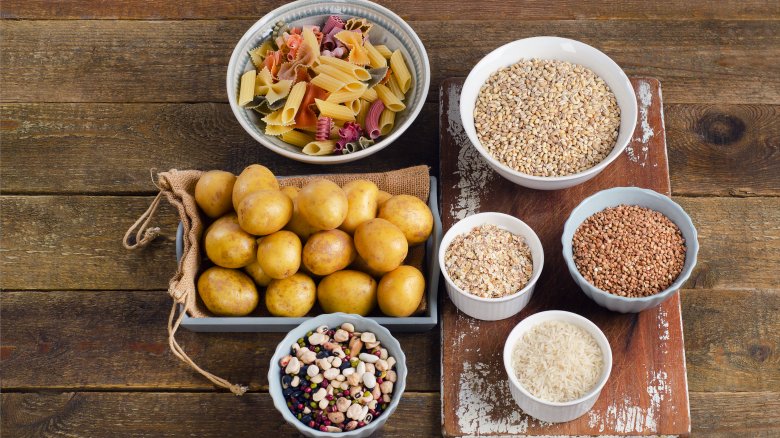Signs You Need To Switch Up Your Diet
If you don't have any allergies or ailments, you might not pay much attention to your day-to-day diet. You're just trying to eat and eat well. There might be some relatively subtle signs, however, that it might be time to not only pay more attention to your diet, but also to consider switching up some things. Some signs that your diet might not be ideal are hardly noticeable, but others can be downright distressing. Recognizing the signs — and the conditions that they might be signifying — is the first step to changing things for the better or, at least, knowing why those things might be happening. For healthier — and happier — eating, realizing what you're doing wrong is the first step towards doing things right.
Your hair is brittle or falling out
If you can't figure out why your hair is so brittle and damaged or even falling out of your head, it might be because of a nutrient deficiency. Dark leafy greens like spinach are a good idea to add to your diet if your hair is exceptionally brittle. Iron, vitamin A, vitamin C, folate, and beta carotene — all prevalent in spinach — can help moisturize your scalp so that your hair will be healthy instead of damaged. Additionally, foods high in iron can help alleviate hair loss.
If you're eating too much high-mercury fish, as dermatologist Dr. Jessica Wu told HuffPost, you might also experience hair loss (among other potential issues). It requires an awful lot of the fish, however, to really make a difference, so unless you're eating an extraordinary amount, it's unlikely that's the culprit.
You're constantly tired
Busy work weeks, hectic, harried weekends, life in general, it can all make you a little less vivacious than normal, but if you're constantly exhausted and there's no real explanation that you can think of, it might have more to do with diet and health than with responsibilities. In an interview with Women's Health, registered dietitian Ilyse Schapiro said a lack of iron can make you feel fatigued. Iron assists your body in producing red blood cells and moving oxygen around, which helps keep you feeling refreshed and energized. Incorporating iron-rich foods into your diet a few times a week can help you perk up. Dark leafy greens, meat, fish, beans, and lentils are all good sources.
You can't fall or stay asleep
Spend all night long staring at the ceiling, unable to go asleep? Or fall asleep and then wake up over and over again It might be more than a fluke. In an interview with Bustle, running coach and personal trainer Susie Lemmer said it might be your hormones causing the issue — and healthier diet choices can help. Make sure you're winding down before bed and avoiding caffeine and sugar before bed. It might seem silly or unnecessary, but you might need to quit drinking coffee earlier in the day or cut out high-glycemic desserts except for on special occasions.
You're moody or depressed
If you haven't been eating well-balanced, regular meals, you might notice that you're moodier than normal or that you're feeling down. Schapiro told Women's Health that if you're feeling moody and, well, hangry, you might not be eating enough calories. Look for healthy fats like avocado and nuts and seeds in order to feel more satiated. Schapiro advised about 1,400 calories a day if you're trying to lose weight, and more if you're just looking to maintain.
Feelings of depression can be due to a lack of carbs (another reason to eat those potatoes or that bowl of pasta), as Schapiro told Women's Health. Make sure you're eating some carbs each day and that you're eating enough to prevent blood sugar swings. If you have a history of depression or if you think it might be more than a lack of pasta in your life, make an appointment with a qualified professional — mental health is important and depression is a serious condition.
You're bloated
Bloat is no fun, but sometimes you might be bloated and not even realize it (let alone know what's causing it). In an interview with Bustle, certified healthy lifestyle coach Liz Traines said that sometimes it might be due to too much sugar — like all those office birthday cakes or mid-afternoon cookie breaks. Foods full of magnesium, calcium, and healthy fats are good replacements for those high-sugar favorites, Traines said. Swap the sugar and opt for more nutritious foods and you'll start to de-bloat.
Your skin is dull
Everyone wants healthy, glowing skin, but if your skin is looking less than glowy, it might be your diet. In an interview with Allure, dermatologist Dr. Harold Lancer said that french fries, potato chips, and other salty snacks can all make your skin appear duller because of the salt content. Additionally, fruit and sugary desserts can have a similar effect because of, you guessed it, the sugar. Finally, dairy and caffeine can have a dulling affect on your skin, which means your morning coffee really isn't doing your skin any favors. Water and veggies are your best bets for glowing skin.
You get brain fog
Brain fog is a real thing that can happen to a lot of people from time to time and last up to several weeks (what?). In an interview with Prevention, rheumatologist Dr. Robert Lahita said there is some research that says that obesity might make the risk of cognitive issues — like brain fog — worse. Eating healthy fats like fatty fish can help, as can those dark leafy greens that are oh-so-good for you, and even dark chocolate. The healthy fats are important in preventing or alleviating brain fog, as is iron, so eat up.
Your energy peaks and dips
Your energy levels likely aren't sustained at a stable (high) level throughout the entirety of the day, but if you notice extreme peaks and valleys, it could be what you're eating that's causing it. If you're eating too much sugar, your energy goes soaring and then plummeting over and over again throughout the day. In an interview with the Oprah website, registered dietitian Marina Chaparro, a spokesperson for the Academy of Nutrition and Dietetics, said that if you're routinely eating too much sugar, your hunger hormone, ghrelin, is likely overproduced, while the hormone that tells you that you're full, leptin, isn't as effective at getting its message across.Try cutting back on sugar to see if that helps stabilize your energy levels. No more mid-afternoon crashes sounds pretty good.
Sweet things don't taste as sweet
Find yourself needing more and more sugary sweetness in order to soothe your sweet tooth? It might be because you're eating too much sugar, too often. In an interview with the Oprah website, Dr. Roxanne Sukol, doctor of preventive medicine and the medical director of the Wellness Enterprise at Cleveland Clinic, said excessive sugar intake can alter your sense of taste, making you think that berries, melon, and other sweet foods don't actually taste all that sweet.
You're craving everything
Everyone craves certain foods from time to time, but if you feel like you're craving anything and everything — especially if it's unhealthy — it might be because of your diet. Traines told Bustle that if you're eating a lot of sugary, salty, processed foods, it's not uncommon for you to start craving them more and more. In order to cut down on the cravings, you'll have to cut back on giving in to them. Easier said than done, but your health will thank you — and so will your out of control cravings.
You're constipated
Feeling a little, well, less than regular, if you know what I mean? Constipation has many causes, but what you've been eating lately is definitely one of them. Schapiro told Women's Health that fiber helps your digestive system by "adding bulk" and making things move along more easily. You might need to up your fiber intake in order to ease constipation. Do so slowly over time or you could end up with painful digestive issues. Oats, citrus, lentils, beans, and cruciferous veggies like broccoli are all good places to start.
You eliminated a full food group
Refuse to eat carbs? Cutting out fats or all sugars? Contrary to what you may have been told, it's really not as healthy as you may have thought. In fact, if you've given up an entire food group in an effort to lose weight and slim down, it likely won't work. These kinds of diets aren't sustainable, which means you'll likely gain any lost weight back. Additionally, in the case of carbohydrates, you're losing one of your body's main energy sources, which can lead to feeling sluggish and run down if you've taken great pains to eliminate every source of carbs in your diet. Work on finding the right sources of each nutrient, rather than cutting anything out entirely.
You're always sick
If you're sick all the time, you likely know something's not quite right, but did you know it might be your diet that's causing it? According to Healthline, if you don't eat lots of healthy foods — in the form of a well-rounded, well-balanced diet — you might be more susceptible to falling ill than you otherwise would. A wide variety of nutrients, vitamins, and minerals are best if you want to stay healthy and avoid catching whatever's going around the office or whatever the kids bring home from school.
Your diet is too restrictive to eat with friends and family
Many people go on diets every now and again for tons of different reasons. If you're on a diet, however, that's so particular, specific, and restrictive that it prevents you from easily eating with friends and family, you might want to consider switching it up. According to Reader's Digest, overly restrictive diets aren't sustainable. Eating with friends and family builds bonds and fosters togetherness. It's an important part of life. If your diet prohibits you from doing so, it's probably not a diet you should — or will want to — stick with for very long.














